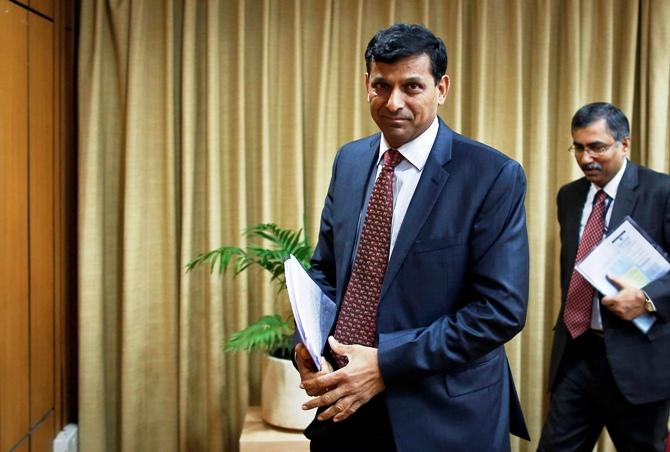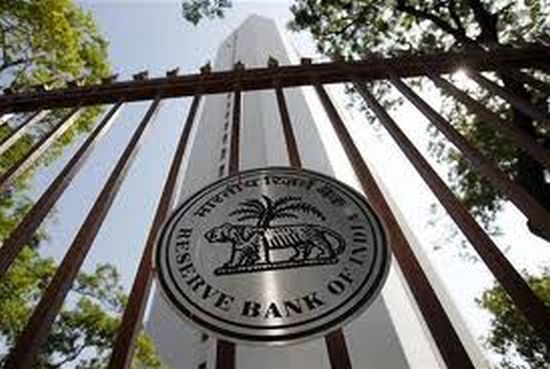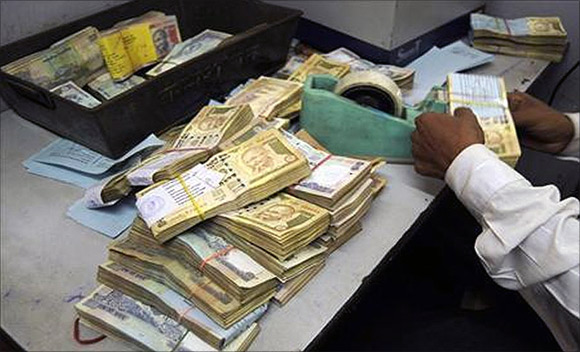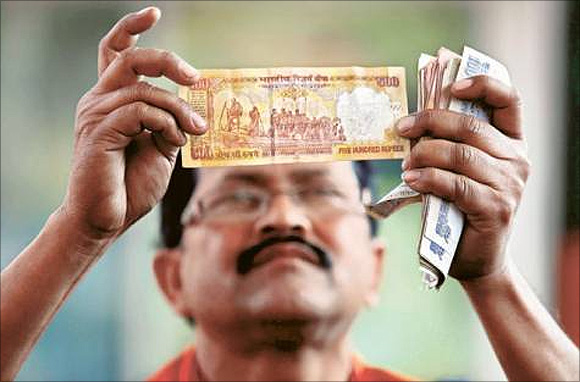Photographs: Danish Siddiqui/Reuters Business Standard
The post-election projections, though they offer a broad range of outcomes, are virtually unanimous in their view that the National Democratic Alliance will form the next government, with Narendra Modi as the prime minister enjoying a relatively safe majority and a clear five-year horizon.
This seems also to be the opinion of the investor community, foreign and domestic -- at least since last week, when equity markets began a surge that continues unabated.
If the final tally to be announced this Friday matches these projections, the upward momentum is likely to continue for a while, bringing in foreign exchange and putting the rupee in appreciation mode.
. . .
Why RBI must start building reserves soon
Image: Reserve Bank of India.Photographs: Reuters
While the markets are acting out their expectations of growth acceleration as a result of policy initiatives that the new government takes, it is important to also see this as an opportunity to rebuild the economy’s defences against external turbulence.
The most direct way of doing this, of course, is to shore up foreign exchange reserves.
Reserve Bank of India Governor Raghuram Rajan has been a consistent advocate of floating exchange rates and this may come in the way of his willingness to buy up dollars, thereby preventing the rupee from discovering its true value.
However, this is not a position that should be cast in stone, particularly when the issue is viewed in the broader context of financial stability.
. . .
Why RBI must start building reserves soon
Image: While a floating rate regime has unquestionable merits, the extremely wide range of movement that the rupee has seen over the past three years also comes with significant downsides.Photographs: Reuters
While a floating rate regime has unquestionable merits, the extremely wide range of movement that the rupee has seen over the past three years also comes with significant downsides.
An enduring method of containing the range of variation in the currency is to narrow the current account deficit in a sustainable way.
That has been accomplished over the past few months, but there are questions about the durability of the adjustment.
That sense of unease needs to be addressed by appropriate policies addressing energy subsidies, mining capacity and, particularly, the appetite for gold. But these will take time to work.
. . .
Why RBI must start building reserves soon
Image: In a delicate inflationary situation, rupee appreciation will contribute to easing inflationary pressures.Photographs: Reuters
Higher reserves are a short-term way to build up protection even as these measures are being put in place.
There is, of course, a downside to this.
In a delicate inflationary situation, rupee appreciation will contribute to easing inflationary pressures.
This benefit will be lost if reserves are to be accumulated, putting more pressure on the RBI to keep interest rates high or even raise them further.
This risk has to be assessed, but in the current situation it may not be very significant.
On the other side, buying up dollars enhances domestic liquidity, which can then feed into inflationary pressures.
. . .
Why RBI must start building reserves soon
Image: An enduring method of containing the range of variation in the currency is to narrow the current account deficit in a sustainable way.Photographs: Reuters
This situation has been dealt with in the past through sterilisation -- selling government securities to soak up the liquidity infused by buying dollars.
This is admittedly messy and carries some risks, but, again, may be a small price to pay for enhancing the level of protection that the economy enjoys against external turbulence.
Overall, macroeconomic stability, particularly on the exchange rate front, is going to reinforce the impact of whatever reform measures the new government initiates.
But insurance always comes at a price, and the RBI and the government need to weigh the costs against the benefits.
At this critical juncture, with a fragile economy and a government finding its feet, more insurance should be preferred to less.






article